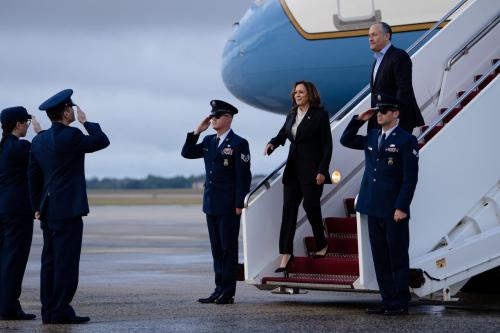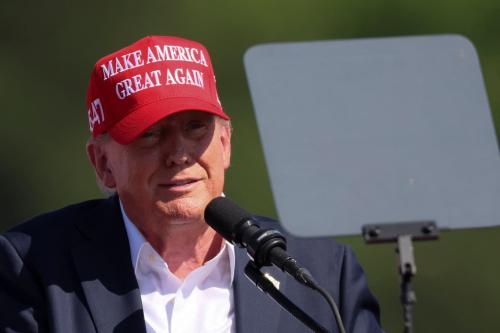Elections do make a difference. The dramatic results of last November’s midterm elections catapulted Democrats to majority status in both the House and the Senate and abruptly awakened the somnolent first branch of government.
In the November/December 2006 issue of Foreign Affairs, we documented and decried the collapse of congressional oversight of the executive across a range of issues, especially foreign and national security policy. The costs of Congress’ checking out had been staggering. With little or no midcourse corrections in decision-making and implementation of measures which might well had followed vigorous oversight, policy had been largely adrift. Sometimes—as with the aftermath of Hurricane Katrina—the consequences were disastrous.
We anticipated that a Democratic takeover of Congress would certainly usher in aggressive challenges to executive actions, including demands for information, subpoenas for committee appearances, and constitutional confrontations. Less certain was how serious, informed, and constructive congressional oversight of the executive would be under a new divided-party government and whether it would translate into wiser policy and more effective implementation of it.
As the new Congress approaches its 100th day, what can we say of its record in fixing the problems that ailed the legislative branch? Steps taken by the Democratic majority at the beginning of the year–setting a target of five-day work weeks, making some changes in ethics rules, and approving a set of parliamentary rules designed to end abuses in the conference process and on the House floor–are encouraging. But in each case, the jury remains out. Congressional leaders are encountering resistance from members on the intensive schedule on Capitol Hill; it will not be easy to sustain the fast pace at which the new Congress set off. The House has yet to pass its version of the Senate bill to amend the Lobbying Disclosure Act. And a bipartisan House task force continues to wrestle with proposals for strengthening the ethics adjudication and enforcement process.
Neither chamber has yet returned to regular order. Promises to deliver an initial “100 hour” agenda, pass a continuing appropriations resolution for the current fiscal year (leftover business from the last Republican Congress), and secure an unambiguous vote on majority sentiment on the war in Iraq have made it difficult if not impossible to follow the normal legislative process, including committee deliberation and floor amendments. In recent weeks, the reins appear to be loosening a bit. Whether the Democrats more consistently live up to the regular-order standard they set for themselves before the election remains to be seen.
When it comes to relations between the Congress and the executive, however, the results are unambiguous. The number of oversight hearings in the first 100 days of this Congress has dramatically outpaced the record of the previous Congress. This holds for a full range of issues, but especially for Iraq and other foreign policy and national security matters. So far this year, almost 100 oversight hearings have been held on Iraq compared with a handful in a comparable period during the previous Congress. The key Armed Services and Foreign Affairs Committees in both the House and the Senate have been particularly active in scrutinizing many aspects of the wars in Iraq and Afghanistan. Other foreign policy issues have garnered the attention of at least 20 other oversight hearings. The focus of virtually all of these hearings has been on public policies, programs, and administration, not personal scandal. Congress has wielded its subpoena power judiciously and tellingly. The circumstances surrounding the firing of eight U.S. District Attorneys would probably not have come to light had the House Judiciary Committee not used its subpoena powers and the Senate Judiciary Committee not demanded relevant records of communication between the White House and the Department of Justice.
Administration officials have abandoned their visible contempt for Congress and have been appearing before congressional committees on a regular basis, now often under oath, and responding to the concerns that have arisen at these hearings. Notable examples include the treatment of soldiers wounded in Iraq and Afghanistan at Walter Reed Army Medical Center, the improper use of national security letters by the FBI, contracting practices in the United States and abroad, and the U.S. Attorney controversy.
Whether this surge in congressional oversight ultimately produces wiser policies and more effective implementation remains to be seen. While the constitutional arsenal of Congress is powerful, it has a limited ability to quickly reverse the course set upon by a determined president. Steps taken through the power of the purse and legislation are both blunt and subject to a presidential veto. But over time, an equally determined Congress can leverage public and expert opinion, initially through committee hearings but eventually through ever-stronger legislative steps, to bring about a change in course. Oversight, even more than direct legislation, is key to movement. Oversight keeps an administration on its toes; the lack of oversight, and the expectation that there will be none, leads to complacency, arrogance, and maladministration.
The investigative oversight we have seen so far, which has dominated the early stages of the 110th Congress, still has to be matched by more garden variety oversight of programs and the implementation of policies through normal authorization and appropriations processes. Over the past 15 years, Congress has gotten out of the habit of reauthorizing programs and agencies on a regular basis. And the appropriations process, usually the best source of good vigorous oversight, has turned in more recent times into a kind of bazaar for allocating earmarks. The real test for Congress is to make sure both of these core areas are reenergized and refocused. That would build on the promise of better performance that we have already seen, however imperfect, in the first hundred days of the new Congress.



Commentary
Op-edThe Hill is Alive With the Sound of Hearings
March 21, 2007